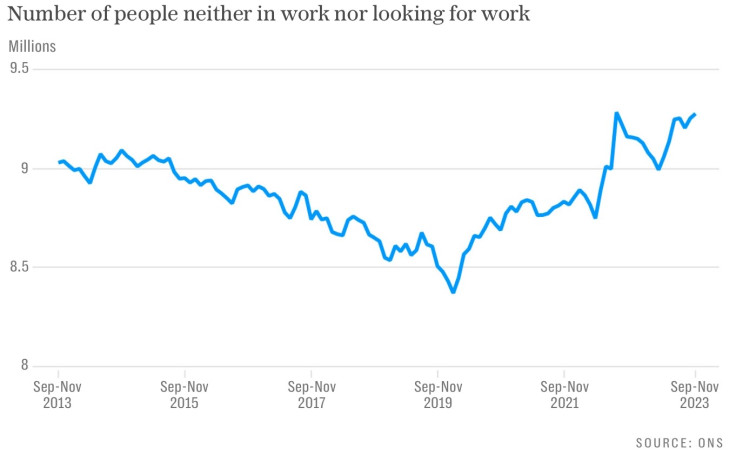
An analysis conducted by the Trades Union Congress (TUC) shows a disturbing trend: A record number of women have been forced out of work due to long-term sickness. The study highlighted that there has been a 48% or 503,000 increase of inactive women in the work force due to long-term sickness over the last five years, totaling to 1.54 million – the highest number since records began.
Among the leading causes based on lengthy NHS waiting lists are musculoskeletal issues, particularly neck and back pain, which affects 126,000 women. This news comes after Prime Minister Rishi Sunak vowed to stop Britain's "sick note culture" last month, demanding that Brits return to work.
The crackdown would see GPs restricted from signing people off work, the benefits system modified, and Britons with "mild" mental health issues pushed back to return to office.

The Dilemma of 1.5 Million Women
The PM's directives contrast the TUC research, which exposed that 1.5 million women have dropped out of the workforce because of long-term sickness.
The figure highlights a 48 per cent jump in the number of women with ill health compared to five years ago. In 2019, the number of female employees leaving their job post for health reasons measured at 503,000.
The rising health crisis amongst female employees means that women account for a staggering 59 per cent of the rise in economic inactivity in the UK, compared with 37 per cent for men. Overall, the number of women who are economically inactive, unemployed, and not seeking employment has increased by 126,000 in the past five years.
Last month, Jane Gratton, a policy director at the British Chamber of Commerce, responded to the mounting statistics: "We are concerned by the growing number of people not looking for work, with a large chunk of those out of action due to long-term health issues. Until we permanently get more people back into the workplace, the upside risks of higher inflation and interest rates will remain."
Mental health issues, depression and anxiety also account for a 69,000 increase in the number of women classed as economically inactive, the data said.
"We need a proper plan for dealing with the sharp rise in long-term sickness," said Paul Nowak, the General Secretary of TUC. "It means dealing with the chronic staffing shortages across the NHS and social care that are delaying patients from being seen when they need to."
"Instead of stigmatising people who are too ill to work, the government should be laser-focused on improving access to treatment and preventing people from becoming too sick to work in the first place," Nowak added.
Growing Concerns of 'Worklessness'
Fuelled by Brexit and the COVID-19 pandemic, the UK has seen growing concerns over a worklessness crisis suffocating the country. The most recent data, published by the Office for National Statistics, revealed that 9.25 million UK working-age adults are currently economically inactive.
Senior Bank of England Official Catherine Mann has since warned that the lack of workers contributing to the economy has become a "very significant issue." Mann noted that there has been a "dramatic deterioration in the estimated potential supply for the United Kingdom," which is pressuring businesses currently facing a staffing crisis.
PM Sunak said that the UK's "Sick Note System" costs taxpayers £69 billion annually. Because of this, the government is investing in ways to get people back to work.
"Our £2.5 billion Back to Work Plan will help over a million people, including women with long-term health conditions, break down barriers to work," a government spokesman added, noting that the GP sick note system was no longer sustainable.
"We are also reforming the benefits system so that it's fairer on the taxpayer and makes sure those who can work do work," the spokesperson explained. "This includes enhancing support for people with health conditions and disabilities through programmes like WorkWell and reforming the Fit Note process so people can return to and stay in employment."







